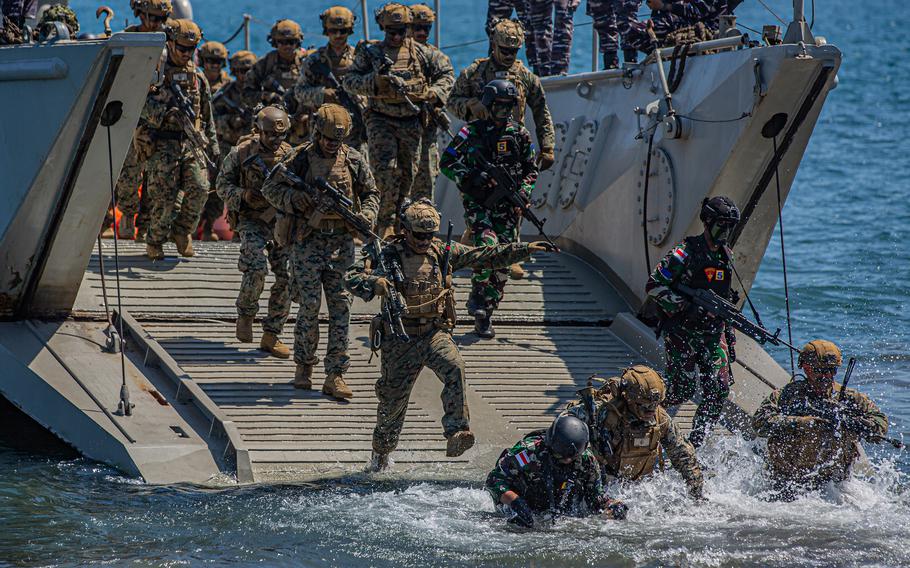
Members of Alpha Company, 1st Battalion, 1st Marine Regiment, 1st Marine Division assault a beach alongside Indonesian troops near Banongan, Indonesia, during the annual Super Garuda Shield exercise, Sept. 5, 2024. (Evangelos Wilson/U.S. Army)
Two weeks of military drills in Indonesia involving 5,500 troops from 10 nations wrapped up Friday as the Southeast Asian democracy balances security against a strong trading relationship with China.
Super Garuda Shield began Aug. 26 with participants from the United States, Indonesia, Australia, Canada, France, Japan, Singapore, South Korea, the United Kingdom and New Zealand. A dozen other countries sent observers.
The U.S. and Indonesia began Garuda Shield in 2007 as a bilateral exercise. China and more than 20 other nations were invited for the 2009 iteration, which focused on peacekeeping, according to the U.S. Army Pacific website that year.
The drills, which greatly expanded in 2022, now aim to build trust and strengthen military-to-military relations, according to a 25th Infantry Division news release Aug. 26.
China — Indonesia’s second largest investor after Singapore — is “conspicuous by its absence” from Super Garuda Shield, said Carlyle Thayer, an emeritus professor at the University of New South Wales and a lecturer at the Australian Defence Force Academy. Trade between Indonesia and China was worth $139.26 billion in 2023, he told Stars and Stripes by email Wednesday.
This year’s exercise was planned under the watch of Indonesian Defense Minister Prabowo Subianto, who was elected president in February and will take office next month, Thayer said.
“Prabowo is pursuing the well-trodden path of pursuing an ‘independent and active’ Indonesian foreign policy or ‘rowing between two reefs’ to avoid alignment with China or the United States,” he said.
Prabowo as president-elect visited China in April and reassured President Xi Jinping he would continue President Joko Widodo’s friendly policies toward China, Thayer said.
However, Indonesia recently signed defense agreements with the U.S. and Australia, and plans its largest exercise yet with Australia in November, Thayer said.
China is the most influential economic and political-strategic power in the region, significantly outpacing the U.S., according to the annual State of Southeast Asia survey published in April by the Association of Southeast Asian Nations Studies Centre — Yusof Ishak Institute in Singapore.
Just over half the poll’s 2,000 respondents prefer China if the region is forced to align itself in the ongoing U.S.-China rivalry. But many indicated an independent stance is preferable to embracing either power.
Indonesia has so far refrained from commenting on the escalating maritime clashes between Beijing and Manila in the South China Sea, Thayer said.
“The sub-text of Indonesia’s current defence cooperation with the United States and Australia is to build maritime capacity in order to hedge against China,” he said.
China’s coast guard continues to patrol north of the Natunas Islands, within Indonesia’s 200-nautical-mile economic zone but outside it’s 12-nautical-mile territorial waters, Ian Chong, an associate professor of political science at the National University of Singapore, said by email Thursday.
“I don’t think Indonesia will accept [China’s] claims, but they may have decided to treat things more quietly given that they are on the cusp of their presidential transition,” he said.
The U.S. contingent at this year’s Super Garuda Shield was composed of 2,500 troops including members of the 3rd Infantry Brigade Combat Team, 25th Infantry Division, in Hawaii, and the 11th Airborne Division in Alaska.
Marines in the contingent came from the 1st Marine Division in California; the 31st Marine Expeditionary Unit on Okinawa; and the 1st Marine Aircraft Wing at Kaneohe Bay, Hawaii. The Navy dispatched the amphibious transport dock ship USS Green Bay from Sasebo Naval Base, Japan.
Most of the training took place in East Java and West Java but an airborne operation was held on Sumatra, Adan Cazarez, 25th ID spokesman in Indonesia, said by email Wednesday.
“We are treating this as a rehearsal for how we would operate together,” U.S. Army Col. Adisa King, commander of a combined ground task force during the exercise, said by phone from Indonesia that day.
The drills were to conclude with a multinational live-fire exercise involving troops from the U.S., Indonesia, Japan, Australia, Singapore, and the United Kingdom at Puslatpur on Java, he said.